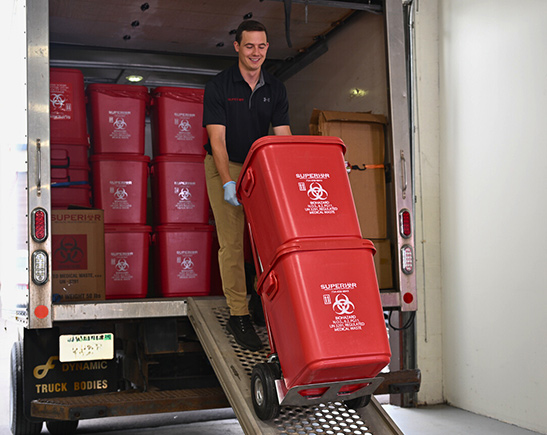Streamlined Solutions: Simplifying Health Care Protocols with Professional Medical Waste Disposal
Streamlined Solutions: Simplifying Health Care Protocols with Professional Medical Waste Disposal
Blog Article
Exploring Various Waste Disposal Options for a Cleaner Atmosphere
In the search of a cleaner setting, the monitoring of waste disposal has actually become a critical prime focus for sustainable development. With a wide variety of garbage disposal alternatives available, ranging from typical landfill methods to innovative waste-to-energy technologies, the choice of how we handle our waste has far-reaching implications for our planet's wellness. By examining the different strategies and techniques employed in reusing, composting, incineration, land fill management, and waste-to-energy processes, a much deeper understanding of their influences and effectiveness can be gained. The quest for optimal waste disposal approaches that prioritize environmental conservation while satisfying the requirements of an expanding populace stays a pressing problem in today's world.
Recycling Methods
Executing reliable recycling approaches is vital in reducing waste and advertising sustainability in our atmosphere. Reusing involves the procedure of transforming waste products right into recyclable things to avoid unnecessary disposal. One of the most usual recycling methods is worldly recuperation, where materials like paper, metal, glass, and plastic are accumulated, sorted, and processed to develop brand-new products. This procedure not only conserves natural resources yet also minimizes power consumption and greenhouse gas discharges connected with producing brand-new products from the ground up.
One more crucial recycling approach is composting, which involves disintegrating natural waste like food scraps and backyard trimmings into nutrient-rich soil. This process not just diverts natural waste from garbage dumps yet additionally produces a useful source for horticulture and agriculture. Additionally, upcycling is an innovative recycling technique that includes transforming old or thrown out products right into items of better or value. By integrating these different reusing techniques into our waste management methods, we can substantially minimize our ecological footprint and move in the direction of a more sustainable future.

Composting Techniques
Efficient waste monitoring methods, such as reusing techniques, pave the means for a cleaner atmosphere, and currently, shifting the focus to 'Composting Techniques', we discover sustainable methods to break down natural waste for ecological advantage. medical waste disposal.
Composting is a natural procedure that changes natural waste, like food scraps and yard trimmings, into a nutrient-rich soil change. The trick to successful composting hinges on creating the appropriate equilibrium of green materials, such as vegetables and fruit scraps, and brownish products, like dried leaves and branches. These materials decay with the assistance of microbes, breaking down the waste into important garden compost.
Typical backyard composting involves layering organic materials in a bin or pile and routinely transforming the mix to freshen it. By utilizing composting strategies, we can minimize the quantity of waste sent out to garbage dumps while producing a beneficial product for improving soil and sustaining plant growth.
Incineration Cons and pros
Incineration, as a waste disposal approach, offers both benefits and drawbacks that merit mindful factor to consider in the world of lasting waste administration methods. On the favorable side, incineration can considerably reduce the quantity of waste, decreasing the demand for garbage dump area and possibly reducing greenhouse gas emissions. Incineration additionally enables the healing of energy through the generation of electrical power or warmth, adding to resource recovery. The process can be made use of to ruin dangerous materials, providing a secure method for dealing with particular types of waste that may posture dangers to public wellness and the atmosphere if left unattended.
In addition, the high first financial investment and operational expenses of incineration centers present economic challenges, making it a this link less economical option contrasted to other waste monitoring strategies. Mindful monitoring and policy are necessary to alleviate these adverse effects and maximize the advantages of incineration as component of a detailed waste monitoring strategy.
Landfill Management Strategies
Garbage dumps play a vital function in waste monitoring and ecological preservation by giving a control system for the disposal of strong waste products. By condensing the waste, the quantity is decreased, allowing for more waste to be suited over time.
In addition, the application of day-to-day cover practices is vital in reducing smells, protecting against clutter, and lowering the tourist attraction of insects. Treatment the disposed waste at the end of daily assists to consist of odors and prevent possible ecological contamination. Furthermore, the monitoring of landfill gas emissions and leachate degrees is critical in making sure that environmental criteria are satisfied and that any prospective risks to bordering ecological communities are lessened.

Waste-to-Energy Technologies
Among the cutting-edge approaches to lose monitoring entails utilizing Waste-to-Energy innovations to convert solid waste into useful energy resources. Waste-to-Energy (WtE) technologies include a series of processes that aim to draw out power from waste products via thermal, chemical, or organic methods. This conversion procedure not only minimizes the quantity of waste that winds up in landfills yet also generates beneficial power sources such as power, warmth, or biofuels.
There are numerous approaches of Waste-to-Energy conversion, including gasification, incineration, and pyrolysis. Incineration includes burning waste at high temperatures to generate warmth and power. Gasification transforms waste into a syngas, which can be used for power generation or chemical manufacturing. Pyrolysis breaks down organic products utilizing heats in the lack of oxygen, creating gas, char, and bio-oil.
Applying Waste-to-Energy innovations can assist mitigate ecological issues related to conventional waste disposal techniques while at the same time giving a renewable resource source. Cautious factor to consider has to be provided to exhausts control and ensuring the sustainability of feedstock materials for these modern technologies to be truly useful for a cleaner environment.

Conclusion
In final thought, checking out numerous garbage disposal alternatives such as recycling, composting, incineration, garbage dump administration, and waste-to-energy modern technologies is essential for promoting a cleaner environment - click here. Each approach has its own advantages and difficulties, but by using a combination of these approaches, we can work towards minimizing the quantity of waste that finishes up in landfills and ultimately add to an extra sustainable future for generations to come
With a wide variety of waste disposal choices readily available, varying from conventional land fill methods to innovative waste-to-energy innovations, the selection of how we handle our waste has far-ranging implications for our planet's well-being. medical waste removal service.Incineration, as a waste disposal method, presents both benefits and negative aspects that merit mindful consideration in the realm of lasting waste management practices.Land fills play an important function in waste management and environmental conservation by offering a containment system for the disposal of strong waste products. By compacting the waste, the volume is decreased, enabling for more waste to be accommodated over time
One of the innovative methods to waste management involves taking advantage of Waste-to-Energy modern technologies to transform solid waste into usable power sources.
Report this page